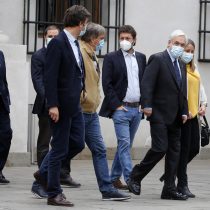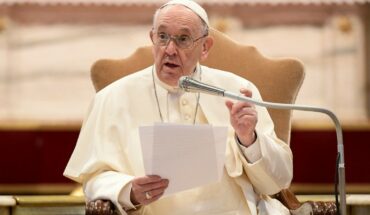
One of the calculations being made behind closed doors in both the UDI and The National Renewal, in the midst of the construction of their parliamentary lists, speaks of a potential loss of 50% of their parliamentary seats. The troubling number comes as we review the outcome of the election to the constitutional convention, where the bet was to reach at least a third of the 155 members, and where they eventually reached only 37. Beyond the oxygen that sebastian Sichel’s victory gave to the sector and the participation of one million three hundred thousand voters in the primaries, the Chile Vamos brand has depreciated bonds, so the alarms, more than ever, are in red.
In this way, it is understood that the pressure that has been exerted, from all levels of Chile Vamos, towards La Moneda to take a definition of what its strategy will be to sustain the shelf, this time, based on aid to families in the midst of the pandemic. Although, from the palace they have reiterated that they will not leave alone the people who need it, this lack of definition has for now totally dissatisfied the leaders of the sector, who are urgently looking for a concrete plan to sustain the campaigns four months before an election, which could leave them out of play in all decision-making spaces.
And in this dilemma, the possible withdrawal of 10 percent from the AFP is crossed again, which threatens to once again overcome the position of the government, which has refused on the last three occasions, but that the political deficit in its management has led them to three defeats that dragged with them In addition, a loss of confidence of the ruling parties not only with the executive, but fundamentally with President Sebastián Piñera himself.
Outwardly, the official and majority position of Chile Vamos, is to avoid the eventual fourth withdrawal, since not only threatens the survival of a pension system that is on a tightrope, but a parliamentary vote to the contrary would imply a hard blow to the leadership of the presidential candidate of the ruling party, who marked his position on the matter. , including warnings to MPs to get off the rails.
Although, at this time there is no water in the pool for an eventual approval of the withdrawal, the ministers of the political committee have already commissioned the presidents of Chile Vamos to conduct an internal poll to have a better understanding of the terrain in which they are walking. And it will be based on that information, the determinations that will be made. This has to do with how many parliamentarians would be willing to vote in favor of the withdrawal, without an extended IFE or with the required measure, and what their demands would be. If the entire opposition voted in favour, only 11 pro-government votes would be needed for it to pass.
And it is known by all, as in the past, how difficult it is for a parliamentarian to refuse to vote in favour of the withdrawal of four 10 percent in the middle of the electoral campaign, and without a weighty alternative that meets the needs of his electorate. It is that edge that is on the table, and it is, at the same time, one of the most worrying. In this regard, one of the leaders of the sector said that given the context, and the widespread fear that exists that the “radical left” will take over the government and parliament, which sees it feasible to end both “with the IFE extended and with the fourth consummate withdrawal, all the meat on the grill.”
To further complicate the picture, an idea born from the Ministry of Labor, which was later adopted by the deputies of the UDI, Guillermo Ramirez and Jorge Alessandri, bets on the now called labor IFE, and that consists of keeping the bonus even if a formal job is found, this, in the words of a source of the Executive serves “to avoid hiring in black” , that is, that a person who finds work prefers not to formalise it through a contract in order to avoid losing state aid.
For now, the numbers that La Moneda has put on the table speak of a cost of about $11 billion, if the IFE were extended until December, as its own claim. This is the task that Finance Minister Rodrigo Cerda, who is in charge of conducting the negotiations with his counterpart from the Presidency Juan Jose Ossa, is seeking to resolve. Faced with this dilemma, a palace official, without mincing his words, and with pragmatic calculation, wondered: “What is worth more, eleven billion dollars, or a left-wing government and parliament?”.
Voices within La Moneda have recognized the complexity of the mathematics between the economy, the signal to the citizenry and the electoral context. For now, representatives exogenous to the decision-making in the Government House, are waiting for a prompt definition to be taken, and thus avoid repeating past actions, which by not having a clear position and not getting involved in the debate, led them to pay a cost that is not yet finished measuring the consequences for the sector.
The dean of the Faculty of Social Sciences of the Autonomous University, Tomás Duval, summarized the conflict that is being experienced by pointing out that “perhaps the question that underlies this is whether the government is willing to remove or end the bonds and assume their effects. In this context, it seems to me that there are certain signs to look at. Slight improvement in polls of President Piñera (without excessive prominence), slight improvement in the short-term economic outlook, successful vaccination process. From this point of view, then, the government should extend the bonds to December in order to avoid the fourth withdrawal and reassure the political parties in their deployment of campaigns, and not repeat past junctures in which Chile Vamos blames the Executive Directly.”
In other words, Duval added, “without bonds, Chile Vamos’s campaign is reduced to its own sector to mobilize with little chance of electoral growth.”
From the opposition in parliament, splintered from its presidential candidates, the bet remains the same, to pressure the government through the threat of the fourth withdrawal in order to achieve an improvement or expansion in social aid. Formula that has worked in two aspects, a substantial improvement in the contributions to the citizenry, and by default, its electoral flag, and that have worn both the DC candidate, Yasna Provoste, and Paula Narváez herself (PS), pointing out that without the opposition, the figures that the Government put on the table at the beginning , they were not enough to take charge of the problem that was being experienced.
The other letter
There are not two readings regarding the impossibility of succeeding in pushing through the pension reform, a campaign promise of this government and for which they gambled everything for everything, but which was impossible for them to carry out. There are several reasons, either because of the lack of strength and clarity of the Executive and its sector, and the fact – they point out in the Palace – that the opposition joined as rarely in an immovable position, and that bet the extra six points of contribution to solidarity, “a scratch of an unacceptable field” for the right-wing electorate Indicated.
In addition, the same sources pointed out, the concern that with the three previous withdrawals, added to a possible fourth withdrawal, would mean leaving nearly five million contributors without funds. “The numbers are no longer enough to continue pushing for a major reform,” mainly because the “defunding” of the system, which took more than $30 billion out of its coffers, left short the numbers that were on hand, and that contemplated arrangements until the second withdrawal. “You’d have to do all the numbers again,” and there’s no water in the pool for that, they said.
Therefore, for now the bet is the short law, where there would already be a principle of agreement with the members of the Senate Finance Committee, with Ximena Rincón mainly, and that would bet on repeating what was done the previous year, that is, raise the basic solidarity pension, and that this will begin to be paid in September , date of termination of the ife payment, for now.
With this, they assume in the Palace, the tension should be lowered “to some degree” before the parliamentarians who claim not to have the tools to explain to their electorate a possible rejection of the fourth withdrawal of AFP funds.
The problem, they said, is that this increase in public treasury spending, mainly due to all the people who were left with zero weight in their accounts, and who therefore become part of those who would receive the basic solidarity pension, puts them between a rock and a hard place. Because while it is feasible, they know that every agreement from now on means “bread for today and hunger for tomorrow.”





